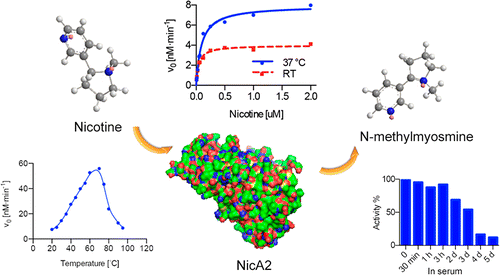Bacterial Enzyme Might Help Quit Smoking

Researchers from The Scripps Research Institute (TSRI) in La Jolla, CA have discovered a bacterial enzyme that degrades nicotine. The enzyme has been tested in vitro and could be used in the future to break down nicotine in the body before it reaches the brain. The finding was published in JACS.Smoking is the main cause of preventable diseases. Anything that helps people quit smoking will reduce the prevalence of tobacco-related illnesses. Dr. Janda and colleagues had been trying to synthesize in the lab a compound that destroyed nicotine. If the molecule is broken down before it reaches the brain, the consumer does not experience the “reward”, which can trigger relapse into smoking. Eventually they came across one produced in nature, NicA2 from Pseudomonas putida. This bacteria was isolated from soil in a tobacco field, and consumes nicotine as its only carbon and nitrogen source. The researchers tried NicA2 in mice serum supplemented with a dose of nicotine equivalent to one cigarette. The half-life of nicotine dropped from 3 hours to 15 minutes.
The team is in the early phase of drug development process, conducting tests to check if NicA2 has potential use as a therapeutic. So far, the results invite to optimism. It can be recreated in lab settings. It is stable in serum, also at high temperatures. It does not produce toxic metabolites when breaking down nicotine. Additional modifications are being tried out to avoid immune problems and improve its therapeutic properties.
Source: TSRI


